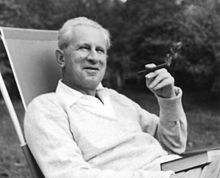Herbert Marcuse
| Herbert Marcuse | |
|---|---|

Marcuse in 1955 in Newton, Massachusetts
|
|
| Born | 19 July 1898 Berlin, German Empire |
| Died | 29 July 1979 (aged 81) Starnberg, West Germany |
| Residence | Germany, United States |
| Nationality | German / American |
| Era | 20th-century philosophy |
| Region | Western Philosophy |
| School | Frankfurt School, Western Marxism, Critical theory |
|
Main interests
|
Social theory, communism, socialism, industrialism, technology |
|
Notable ideas
|
Totally administered society, technological rationality, The Great Refusal, The End of Utopia, One-Dimensional Man, Libidinal work relations, work as free play, repressive tolerance, surplus repression, performance principle, repressive desublimation, totalitarian democracy |
|
Influenced
|
|
Herbert Marcuse (German: [maʀˈkuːzə]; July 19, 1898 – July 29, 1979) was a German-American philosopher, sociologist, and political theorist, associated with the Frankfurt School of Critical Theory. Born in Berlin, Marcuse studied at the universities of Berlin and then at Freiburg, where he received his Ph.D. He was a prominent figure in the Frankfurt-based Institute for Social Research – what later became known as the Frankfurt School. He was married to Sophie Wertheim (1924–1951), Inge Neumann (1955–1972), and Erica Sherover (1976–1979). In his written works, he criticized capitalism, modern technology, historical materialism and entertainment culture, arguing that they represent new forms of social control.
After his studies, in the late 1960s and the 1970s he became known as the preeminent theorist of the New Left and the student movements of Germany, France, and the United States. Between 1943 and 1950, Marcuse worked in U.S. Government Service, which helped form the basis of his book Soviet Marxism: A Critical Analysis (1958). Celebrated as the "Father of the New Left", his best known works are Eros and Civilization (1955) and One-Dimensional Man (1964). His Marxist scholarship inspired many radical intellectuals and political activists in the 1960s and 1970s, both in the United States and internationally.
Herbert Marcuse was born in Berlin, to Carl Marcuse and Gertrud Kreslawsky. His family was Jewish. In 1916 he was drafted into the German Army, but only worked in horse stables in Berlin during World War I. He then became a member of a Soldiers' Council that participated in the aborted socialist Spartacist uprising. He completed his Ph.D. thesis at the University of Freiburg in 1922 on the German Künstlerroman after which he moved back to Berlin, where he worked in publishing. In 1924 he married Sophie Wertheim, a mathematician. He returned to Freiburg in 1928 to study with Edmund Husserl and write a Habilitation with Martin Heidegger, which was published in 1932 as Hegel's Ontology and Theory of Historicity (Hegels Ontologie und die Theorie der Geschichtlichkeit). This study was written in the context of the Hegel renaissance that was taking place in Europe with an emphasis on Hegel's ontology of life and history, idealist theory of spirit and dialectic. With his academic career blocked by the rise of the Third Reich, in 1933 Marcuse joined the Institut für Sozialforschung (Institute for Social Research), popularly known as the Frankfurt School, in 1932. He went almost at once into exile with them, first briefly in Geneva, then in the United States. Unlike some others, Marcuse did not return to Germany after the war, and when he visited Frankfurt in 1956, the young Jürgen Habermas was surprised to discover that he was a key member of the Institute.
...
Wikipedia
